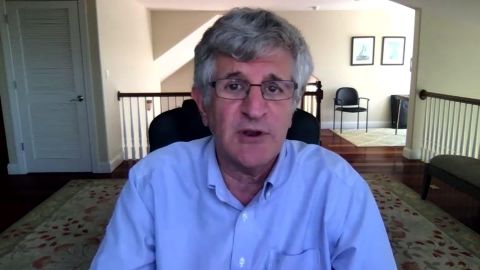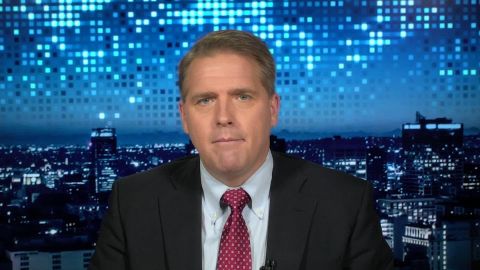Read Transcript EXPAND
CHRISTIANE AMANPOUR: And as we said, with the Republican Convention in the spotlight this week, we now turn to a former member of the party who simply had had enough. Beth Fukumoto served in the Hawaii House of Representatives for three terms. But the party forced her resignation after she publicly denounced President Trump’s policies and his rhetoric. She is now openly acknowledging what she calls her political failings and is now a Democrat. Here she is talking with our Michel Martin about the racism she endured and what led to her resignation.
MICHEL MARTIN: Thanks, Christiane. Beth Fukumoto, thank you so much for talking with us.
FMR. STATE REP. BETH FUKUMOTO (D-HI): Of course. Thank you.
MARTIN: You served three terms in the Hawaii House of Representatives. You rose to minority leader. You were one of the youngest people ever in a leadership position like that. So, you were clearly on the rise there before all the events took place that we’re now going to talk about. But I was just wondering if you wouldn’t mind taking us back to why you were attracted to the Republican Party to begin with.
FUKUMOTO: Sure. well, I think, for context, I was — it was 2008 when I was graduating from my master’s program, and went back to Hawaii because of the recession, and found a job working in the legislature. And I found a job working with the Republicans in the legislature. And I think what I saw — my state had been Democratically controlled since 1954. And so most of the policies that were in place were all Democratic policies, or at least they have had the ability to implement their policies since 1954. And I felt like, as somebody who was watching my community really suffer from the recession, and just economically, nobody was being able to build wealth, people were having trouble having a place to live, it — our cost of living was just skyrocketing. And I didn’t feel like the legislation was taking that seriously enough. And as somebody that was newly out of graduate school, and didn’t have much of a political background, the natural conclusion for me was that it must be that those principles didn’t work. So perhaps we should try Republican principles, and specifically things like being more careful with money, being cautious with government spending, not overtaxing people. All of that really appealed to me at the time, from the world view that I had.
MARTIN: Well, in fact, you were one of the standard-bearers, as I recall.
FUKUMOTO: Yes.
MARTIN: I mean, that was this initiative that was announced by the then chairman of the Republican National Committee, a multimillion-dollar initiative to kind of recruit, train and support diverse candidates across the country, particularly at the state and local level, as I recall. And weren’t you one of the people who were selected to kind of roll that out?
FUKUMOTO: Yes, I think one of the first events that I did — it was, I think, the first event I did at the RNC was this announcement that we were going to be putting money into state level races, specifically to get women and other candidates, specifically people of color to have backing, so that they could run for office, so they can achieve — we could achieve a better balance and more diversity amongst even our candidates.
MARTIN: So, what happened for you. When did you start to feel disaffected? When did you start to feel, well, maybe this isn’t what I thought it was?
FUKUMOTO: There were multiple things going on, right? You definitely — I knew that a lot of — at least some portion of the party was only doing this because they wanted to be able to win. And I thought that, as long as that coincided with what I actually wanted, which was more diversity on our tickets, then it was fine. We could work together. We could move forward. I think what — that was something I thought was going to be OK with me and, over time, realized that it wasn’t going to be. Part of it was that I was in this position where I should have been able to set policy. I should have been able to set the vision. And I was to a certain extent in Hawaii. But what I noticed fairly quickly, especially as Donald Trump and — I guess as Donald Trump started to pick up speed, what I realized very quickly is, I was only valued in the party, and my diverse face, if you will, was only valuable as long as that’s all it was. And if I had different opinions, if I wanted to voice something else, then quickly people didn’t want me on the stage anymore.
MARTIN: Well, give an example of that. How did that become clear to you?
FUKUMOTO: So, I think the example would be when I started talking about Donald — specifically, Donald Trump in December of 2015 was the first interview that I did, saying that I thought that the comments that he made about Japanese-American internment were appalling and didn’t have any place in the Republican Party. That, to me, should have been a perfectly good message, given that we were trying to make this new party. That’s what we said we were trying to do. So, when I realized that — first of all, when Donald Trump started talking about the Muslim registry, I started to get very concerned, started to talk to other Republicans who were much less concerned, and many of them said, this is not something that’s ever going to happen, he’s just using it as rhetoric, and brushed it off. And then when I tried to talk to RNC and say, this is impacting the message we’re putting out, it’s the exact opposite of all the things you told me to say, let me talk about it, they basically said, we don’t want to talk about this, because it’s not in the news cycle. And so, for me, I started speaking out then, and then quickly, within a few months, there was a complaint against me. A few months later, I said the same things again at the state convention, and was booed for 15 minutes. But I just really thought we needed to talk about this, because it was so different than what we said we were doing, that we needed to at least acknowledge what had gone wrong.
MARTIN: You were actually removed from your leadership position.
FUKUMOTO: That’s right.
MARTIN: Is that you — that’s right after you appeared at the Women’s March…
FUKUMOTO: Right.
MARTIN: … which followed the inauguration of President Trump. And you spoke at that event, and then what happened after that?
FUKUMOTO: Yes. And so, at this event, I — what I said was that I thought that you people watched — that kids specifically watched a bully win the White House and that we needed to show those kids that love and kindness and respect still matter, and that that’s going to win in the end. Those remarks were not welcome in the Republican Party. And I realized very, very quickly that, now that he was the president, that they were going to act fast. And so, within 24 hours, people were again calling for my resignation. My caucus had sort of brought me in and said, we will keep you as leader if you promise not to speak ill of the president anymore for the remainder of his term, which I think, for me, that was sort of the final, final thing that made me realize this is not something I could continue to be a part of.
MARTIN: You finally resigned. I mean, you resigned your seat or you just resigned from that leadership position?
FUKUMOTO: To clarify, I did not resign from the leadership position. I resigned from the party. What I did — the leadership position, in that meeting, what I had said to them, they asked me to resign because they didn’t want it to be sort of a media spectacle. And what I had said to them is, if they wanted to do this, they were going to have to do it in public, and they are going to have to take it out on the floor, because I just feel like people need to be braver. And if they wanted to make that decision, I didn’t want to let them hide it. And so that — they took me out on the floor. They removed me as leader, and I resigned from the party. I had done so just before that, knowing what was coming.
MARTIN: You posted your resignation letter. And you said that — let me just read a little bit of it. You said that: “Since becoming a member eight years ago, I have suggested our local party should reflect our uniquely diverse community. I believed that, if I was committed to this cause, I could help attract more people to the party. But a little more than a year ago, my fellow caucus members told me, we are the party of Middle America. I don’t care if the demographics don’t fit. And he declared that Republicans are the national majority. It’s our responsibility to represent Middle American values here in Hawaii,” to sort of your point. And you said that: “It was in that moment I was finally able to identify the colonial mind-set I had unknowingly run up against for years.” And no — which is remarkable, because as you point out, no ethnic group in Hawaii is a majority. I mean, Hawaii is the kind of model for what America is becoming.
FUKUMOTO: I think that Hawaii absolutely as a model for the way the country — the direction the country is going, when people feel like they’re getting boxed into a corner. They’re used to being the majority — or at least used to having more power, and they’re starting to see it erode. Then what sometimes comes back at you is — the vitriol that comes back is intense. And it intensifies the harder — the harder they feel their lives get. And I think what — in Hawaii, what had happened is, for so long, there’s a specific group of people — within the Hawaii Republican Party, for so long, there had been a specific group of people that saw themselves getting — saw their power getting smaller and smaller, and Donald Trump gave them the hope that they were going to have power again.
MARTIN: You said, in part, that you joined the Republican Party in part because of policies. You felt that the policies that the Democratic Party was espousing there were ill-suited to the needs of the state. What you’re telling me is, it suggests that it really wasn’t about policy at all. It’s about identity. Do you think that’s true?
FUKUMOTO: I think it’s always been about something else. I think one of the things, just anecdotally, from Hawaii is, I put out a lot of bills, and our caucus packages were definitely more progressive than most Republican caucus packages would be anywhere else in the country. But my members signed on. Those same members that supported Trump, they still signed on. And that does say to me that it’s not about policy, in the same way that we have seen Trump say that he’s going to do certain things and then — like build the wall, and then not do it, and nobody holds him accountable, because that’s not really what it was about, right? What it is about is feeling like suddenly your identity is being recognized and put back in the place that you believe that it should be. I think the minute people saw a window to do things differently — so, the party was trying to be more diverse. The national party was saying, we have to change the way we appeal to communities of color specifically, how we appeal to young people, how we appeal to women. And that was a path that people were willing to go down if it was the only way. And the minute Donald Trump said, no, there’s this other way, people immediately went there. And I don’t remember policy being that much of a conversation point ever, really.
MARTIN: You wrote a piece for “The Washington Post” earlier this month. It was titled “I was a Republican, and I drew my red line too late. I will answer for my choices for years to come.” What are you saying in this piece, and who are you hoping to reach with this piece?
FUKUMOTO: Yes, I think what I am saying is, I went along with the party even when I was having doubts, right? I still played the game of, how do you stay elected and how do you how do you give the party just enough so that they will let me keep doing this thing that I’m doing? And, to an extent, that’s a game that everybody plays. But things like I mentioned in the op-ed, I mentioned voting rights, and that I didn’t fully understand that, when people were talking about voter I.D., it wasn’t hard to get an I.D. in Hawaii, so I didn’t understand what that was being used to do to people in Georgia. But I should have asked more questions. And things like that are things that I’m always going to regret. And what I know now is that you do regret those things, those votes. And the people that I’m talking to are the people who voted for Trump the first time who are still considering doing it again, but can look at him and say, I know that he is in not the person that’s supposed to carry America forward. I know that he doesn’t represent my values. And I know I believe something different. But part of me feels like I should vote for him anyway, because I’m a Republican and I should go along with my party. And what I wanted those people to know is that you regret that someday. Your kids ask you that. Your family members asked you later, how could you have supported that? And that regret is not a fun thing to live with.
MARTIN: One of the things you wrote about in your — in your piece for “The Post” is that, when you started criticizing Donald Trump on the basis of values, as well as policy, and tone, people kept saying things to you like — you kept getting letters saying, like, go back to Japan.
FUKUMOTO: Yes.
MARTIN: And your family has been in Hawaii for, what, four generations?
FUKUMOTO: Four generations, yes, as long as my Irish family, really.
MARTIN: As well as your Irish family, yes, because you’re a family of — like most Americans, have a combined heritage.
(CROSSTALK)
MARTIN: OK. Well, what do you think that’s about?
FUKUMOTO: I think the xenophobia. One of the things that I say often, when I went abroad, and the first time I went specifically to London, was the first time I ever felt fully American. I have been in — I guess, yes, I’m very much American. But we always have those qualifiers, right? And so when I went abroad and felt people treat me as a real American was the first time I recognized that is not how I was treated within my party or the world. And many people have this experience. Many people have this experience in America way worse than I did. But I think switching parties and having just that national profile for a while really showed me — made me a target for people that genuinely don’t want me here, genuinely don’t want people of color here. They believe that to be American is to be white. And, yes, I — the extent and the prevalence of that, and their willingness to say it out loud, and the calls that they would make to me, and all of it just was shocking to me, yes.
MARTIN: Was there any part of you that thought that you should stay within the Republican Party to see whether you could effect change from within?
FUKUMOTO: Yes, that’s part of — part of why I stayed as long as I did. There was a point at which — long before Donald Trump, there was a point at which I knew that this was a 50/50 battle, that there was a chance that the elements that would later elect Trump would take us over. And I thought that I was sort of standing there helping to hold the line, and I was to a certain extent. And I did stay past that moment. And I remember, as a couple of my other friends left, I remember saying to them, it’s not time yet, it’s not over yet. So, once I left, it really — there was a sense of loss. And it was sad, because I was leaving because I felt like it was over, and I had done everything that I could to try to change it.
MARTIN: I do want to ask about something else you said in your piece. You said that: “There are only so many ways to say I was wrong. I have exhausted them all.” Why do you think it’s so important to say that you were wrong and that you’re sorry? Why do you think that matters? I mean, the fact is, people do change their minds. But you seem to feel very strongly that you feel a need to publicly account. And I just wondered why.
FUKUMOTO: Yes, I think that there can be no — this country needs reconciliation. This country needs to be brought back together, and that you can’t do that without acknowledging that you’re wrong. It’s the first step to any change. And, for me, when I see Republicans come out and suddenly change the way they’re talking about diversity or suddenly say that they’re disagreeing with Trump on one particular issue, I immediately don’t trust it often, because there’s been no acknowledgement of wrongdoing. And so, for me, it just feels like another way to win. It’s just changing the message to win. And I think that’s incredibly important for the people who have been wronged to see us, even people like me say, I’m sorry, I know what I did. And I’m going to try to fix it. I don’t think you can move forward about it.
MARTIN: Beth Fukumoto, thank you so much for talking with us.
FUKUMOTO: Of course. Thank you.
About This Episode EXPAND
Christiane speaks with Scott Jennings about what another four years of President Trump would bring. She also speaks with Dr. Paul Offit about convalescent plasma therapy and with Afua Hirsch about the consequences of Britain denying its imperial past. Michel Martin speaks with Beth Fukumoto about the racism that led to her resignation from the Republican Party.
LEARN MORE



